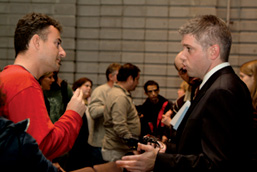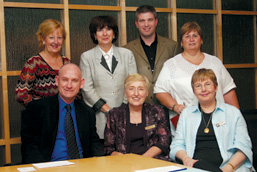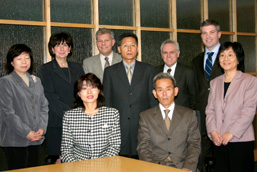|
PS News presents reports on recent College activities and a selection of announcements, events and initiatives in the wider education community that will be of interest to our members. |
new teacher induction
Government's plan echoes College advice
Ontario's newest full-time teachers will get the initial on-the-job support they need and crave.
In early October Ontario's Minister of Education, Gerard Kennedy, announced a $15 million fund to enable school boards to help orient and support newly certified teachers. The Minister said that every new teacher will receive a full year of on-the-job training, mentoring and assessment in the first year of teaching.
The Minister said training will include classroom management, communicating with parents and learning instructional strategies to address students' cultural, second-language, special education and at-risk situations.
He also said he would introduce legislation this fall to repeal the Ontario Teacher Qualifying Test, a pre-condition for membership in Ontario's teaching profession.
"We are determined to continue to reverse the trend of losing too many qualified teachers in their first few years of teaching," Kennedy said.
According to College studies one in 13 new teachers leave the profession within their first three years.
"New teachers want nothing more than to become as effective as they can as fast as possible," said College Chair Marilyn Laframboise, in response to the announcement. "Mentoring goes a long way to making the transition to teaching easier and more quickly rewarding."
The Minister's announcement comes two years after the College recommended a mandatory two-year program of support for new teachers in every Ontario school board. The College's New Teacher Induction: Growing into the Profession policy paper was based on feedback from first-year teachers and consultation with educators and stakeholders across Ontario.
To see the paper, go to www.oct.ca ![]() Publications
Publications ![]() College
Documents
College
Documents ![]() New
Teacher Induction: Growing Into the Profession.
New
Teacher Induction: Growing Into the Profession.
Accreditation
University Faculty of Education representatives visited the College in October to provide background information for a training session of Accreditation panel members.
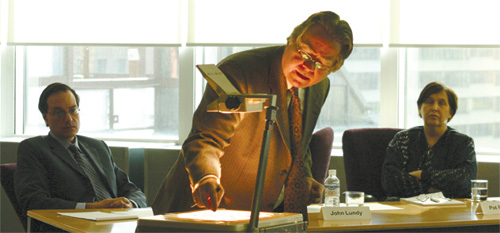
From left: Dean Paul Axelrod of York University, Director John Lundy of Laurentian University (standing), Dean Pat Rogers of the University of Windsor.
Teacher Education
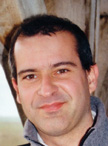 International
report
International
report
A recent report by the Organization for Economic Co-operation and Development (OECD) confirms yet again that qualified and competent teachers trained in first-rate teacher education programs are the number one factor in student success.
Paulo Santiago of OECD's Education and Training Policy Division presented the report on the status of teacher education last May at the conference, Teacher Education for the Schools We Need, hosted by OISE/UT, the Ontario College of Teachers and TV Ontario.
The report – Teachers Matter: Attracting, Developing and Retaining Effective Teachers – was based on trends and developments in teacher education in 25 countries. It examined differences in teacher training, measuring the flexibility of pre-service programs, methods of encouraging communication between student-teachers and schools, and ways of providing career-long support.
Professionally Speaking spoke to Santiago.
The OECD reports that some countries have been unable to adapt their teacher education programs to school needs and the changing profession. What have you observed?
Paulo Santiago: In countries where teacher education is highly academic, some instructors have very little direct contact with the schools. Many programs do not provide practicums and do not communicate with supervisors concerning how their graduates are doing in relation to the school's needs. I think people are becoming increasingly aware that this situation cannot be sustained.
Your research points to innovative teacher education practices, especially in England and Wales. What makes them successful?
Santiago: Their approach is flexible and they take into consideration that some people choose teaching for life while others may choose it for a given period of time.
In England for example, the traditional route – a three- or four-year university program – no longer provides the largest number of teachers. Most new teachers have earned a bachelor degree in a discipline other than teaching and have taken one or two years of master's or doctoral studies.
Effective programs are closely connected to the schools and responsive to contemporary education needs. They integrate standards based on learning objectives so that what happens in schools is reflected in their curriculum.
In Québec (the only Canadian province that took part in the study), we also observed some positive initiatives. Restructuring in the 1990s resulted in longer teacher education programs based on well-defined professional competencies and providing more experience in schools.
What did you find most surprising?
Santiago: First, the concept of evaluation – whereby teachers are evaluated according to improvement objectives – does not seem to be firmly entrenched in the teaching profession. In other professions evaluation is considered a normal, necessary and routine process, but in teaching it is often perceived as a punishment and resisted. The lack of systematic evaluation affects the profession's image.
I am also amazed that professional teaching bodies do not exist in more countries. They improve the status of the profession. If teachers want to consider their occupation as a profession, they need to be committed to the development of standards and competencies – like physicians and lawyers.
The study shows that, in many countries, teachers' professional development is not sufficiently integrated into their work. Why is that?
Santiago: The concept of lifelong professional learning is relatively new and is gradually taking root. But there has not yet been enough research indicating which activities produce the best results. Since resources are limited, little has been invested in this field. To be effective, professional development activities should, among other things, respond to schools' needs and not be exclusively things that are initiated by the teacher alone.
The report recommends a more rigorous selection process for hiring teachers. Don't schools have the best teachers?
Santiago: It varies from country to country and from one system to another. In some systems the basic criteria are a little too restricted. Some countries with centralized recruitment – where schools never meet the teachers they will get – rely strictly on qualifications and academic grades. We don't think that's enough. Direct interviews can reveal motivation, charisma, enthusiasm and willingness to help – criteria that probably spell the difference between a good teacher and an indifferent one.ps
To view a précis of the report (in French
or English), visit www.oecd.org/edu/teacherpolicy ![]() Final
Report
Final
Report ![]() Teachers
Matter. The full report (published in English only) may be borrowed
from the Margaret Wilson Library.
Teachers
Matter. The full report (published in English only) may be borrowed
from the Margaret Wilson Library.
French-language services
College staff have been discussing issues in francophone communities and providing information to future teachers in French-language faculties of education.

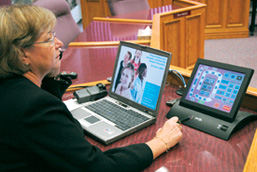
TOP: In Timmins, Lise Roy-Kolbusz meets with Charlotte Laforest, Frédérick Villeneuve and other representatives of the Conseil scolaire de district catholique des Grandes Rivières, and via video-conference with Thérèse Talbot, director of the Conseil des écoles séparées catholiques de Gogama.
|
|
Left: Membership Services Co-ordinator Michael Salvatori answers questions following a presentation made with Lise Roy-Kolbusz at Laurentian University. |
Resources
Free tools for business teachers
The Institute of Chartered Accountants of Ontario is inviting business teachers in Ontario high schools to join its Teacher Colleague Program (TCP). As of September 1, 2005, the program is free to all Ontario high school business teachers.
Teachers will have access to new tools and resources covering a wide range of current issues designed to improve delivery of the business and accounting curriculum. TCP has developed a set of business cases for high school students that can be integrated into the curriculum. Access to educational conferences and seminars is another benefit of joining TCP.
For more information about TCP contact Jon French, Senior Liaison Officer at the Institute of Chartered Accountants of Ontario at 416-969-4278 or 1-800-387-0735, ext 278 or e-mail jfrench@icao.on.ca.
Visitors: Australia, New Zealand, Japan
Delegations visit the College to share and gather information on a range of education issues, including accreditation, qualifications and standards of practice.
|
|
STANDING: Ann Baxter of the University of Wollongong, External Relations Officer Cathy Lofgreen, Membership Services Co-ordinator Michael Salvatori, Evaluation Services Manager Linda Genesi-Williams SEATED: Brian Ferry of the University of Wollongong, Anne Ferguson of TEACH Educational Consultants, Jill Brannock of Queensland University of Technology. |
|
|
Matt Miernik was among representatives from Australian and New Zealand faculties of education who visited the College to be briefed on licensing requirements for graduates of universities outside Ontario. |
|
|
Representatives from Toyota City Board of Education met with College staff this October. |
Career Fairs
College staff answer questions about the teaching profession, the College and Ontario licensing requirements at career and university fairs this fall.
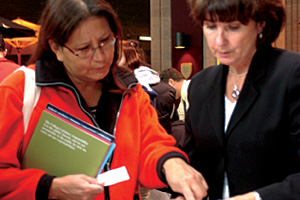 |
Lakehead University Virtual Career Fair |
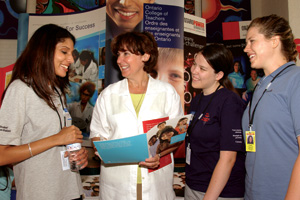 |
Aboriginal Youth Career Fair |
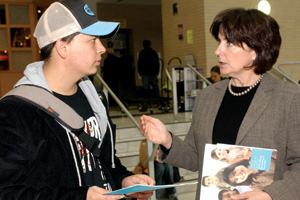 |
McMaster University Continuing Education Fair |
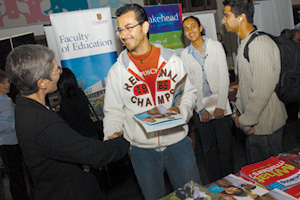 |
University of Waterloo Professional and Post-degree Day |
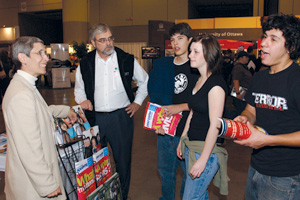 |
Ontario Universities' Fair |
Charity
Daytrippers
Daytrippers Children's Charity makes class excursions a reality for students in lower-income and isolated schools.
Daytrippers allocates the majority of its funding to transportation costs. Students in Grades 4 to 8 are the main recipients of support.
This year, Daytrippers assisted more than 6,500 students from 54 schools to visit recognized educational and cultural institutions.
For more information visit www.daytrippers.org or call 416-830-9966.
Notable Dates
December
1 – World AIDS Day, an international day of action on HIV / AIDS – celebrating progress made in the battle against the epidemic and noting remaining challenges. www.worldaidsday.org
2 – International Day for the Abolition of Slavery marks the date when the UN Convention for the Suppression of the Traffic in Persons and the Exploitation of the Prostitution of Others was adopted by the General Assembly. www.un.org/depts/dhl/slavery includes titles and links of interest.
5 – International Volunteer Day for Economic and Social Development - celebrates the efforts of those who contribute to society by giving their time as volunteers. The United Nations volunteer site is www.unv.org.
January
23-27 – No Name-Calling Week
An annual week of educational activities aimed at ending name-calling of all kinds and providing schools with the tools and inspiration to launch an ongoing dialogue about ways to eliminate bullying in their communities. www.nonamecallingweek.org
27 – Family Literacy Day
A national initiative that promotes the importance of reading and learning together as a family. www.abc-canada.org/fld
February
Black History month www.canadianheritage.gc.ca
5-11 – White Cane Week is a chance to reflect on the changing situations of people who are blind or vision impaired, with emphasis on their capabilities and talents. www.ccbnational.net
15 – National Flag of Canada Day – This year marks the 41st anniversary of the maple leaf flag and the day invites us to look at our shared Canadian values, citizenship and sense of belonging. www.pch.gc.ca/special/flag-drapeau/index_e.cfm
20 – Heritage Day
A celebration of Canada's architectural heritage and historic places. www.heritagecanada.org
March
to March 4
Freedom to Read Week
An event that encourages Canadians to think about and reaffirm their commitment to intellectual freedom, which is guaranteed under the Charter of Rights and Freedoms. www.freedomtoread.ca/default.asp
For other international special days, observances and events, visit www.un.org and click on Conferences & Events, to the left of the UN's 60th anniversary logo.











